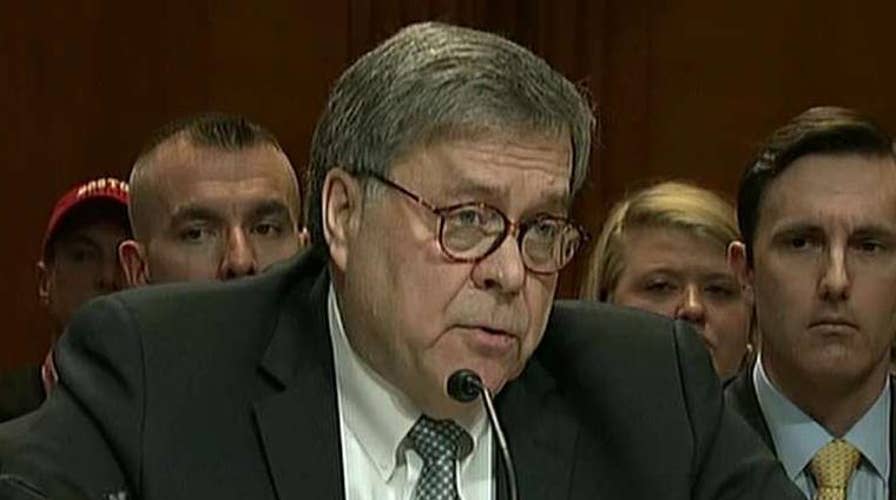Attorney General Bill Barr alleges the FBI spied on the 2016 Trump campaign
Attorney Andrew Stoltmann says there should be an investigation find out if FBI leadership spied on the 2016 Trump campaign.
In his testimony Wednesday before a Senate Appropriations Committee subcommittee, Attorney General William Barr made statements that were so clearly correct, they should be no more controversial than asserting that the sky is blue. The fact that they are causing consternation is what should alarm people.
Barr told senators that “I think spying did occur” in the Trump-Russia investigation conducted by (among others) the Justice Department and the FBI during the 2016 presidential campaign.
“The question,” Barr elaborated, “is whether it was adequately predicated.” Because “spying on a political campaign is a big deal,” he explained that he would undertake an internal review, focusing on what the original rationale was for the spying.
BARR TESTIFIES 'SPYING DID OCCUR' ON TRUMP CAMPAIGN, AMID REPORTED REVIEW OF INFORMANT'S ROLE
We should long ago have known what the rationale was. You know, as surely as you are reading this, that if an incumbent Republican administration had green-lighted a Justice Department and FBI investigation of the Democratic Party’s presidential campaign, we would already be fully informed about what triggered the investigation.
Democrats would have been unified in demanding it, the media would have echoed those demands in an endless loop and – if there had been an abuse of power – all the pertinent heads would by now have rolled.
Alas, we are dealing here with the Obama administration directing an investigation of the campaign of Donald Trump. Candidate Trump was regarded by many in the media and the political establishment as the most unfit presidential candidate ever – a man who would certainly have been predisposed to engage in a corrupt plot with Russia to manipulate the electorate (the only real question being whether Russian President Vladimir Putin would have him).
Candidate Trump was regarded by many in the media and the political establishment as the most unfit presidential candidate ever – a man who would certainly have been predisposed to engage in a corrupt plot with Russia to manipulate the electorate.
For more than two years, that has been the dominant narrative.
As a result, the media, Democrats and even many Republicans have ignored claims of political spying, even as the evidence that it took place mounted – indeed, mounted to the point that whether spying occurred is no long contestable. The narrative has shifted to the claim that the target of the spying was not Trump himself, but rather a few bad apples working in his campaign.
Let’s review a few things we have been saying for years.
There is a presumption in this country against the exploitation of law enforcement and intelligence authorities for political purposes, and in particular against political spying.
But a presumption is not an unbreakable rule. If there were real evidence that the opposition party’s presidential nominee was conspiring with a foreign power to commit crimes, especially espionage to influence the campaign, then the incumbent administration would have an obligation to investigate and to take appropriate action.
What is “appropriate” is dictated by the circumstances. This is a much-misunderstood principle. The fact that the opening of an investigation may be justifiable does not, by itself, justify all investigative tactics that might be used.
Because there is a norm against political spying, opening an investigation of the opposition political party is not like opening an investigation of a Mafia family or a suspected drug conspiracy. An investigation of a political campaign should not be opened unless there is significant evidence of wrongdoing.
Even if there is such evidence, that does not mean anything goes. Using informants to spy on a campaign or its operatives is extremely intrusive and has a high potential for abuse. It should not be done based on a few disturbing connections between campaign surrogates and foreign powers. There should be hard evidence of ongoing, corrupt activities or plotting.
Moreover, if spying is to be conducted under the Foreign Intelligence Surveillance Act, then FISA must be followed. To conduct FISA surveillance of an American citizen suspected of being an agent of a foreign power, there must be probable cause that the American citizen is knowingly – not unwittingly – engaged in clandestine activities on behalf of the foreign power; and those clandestine activities must be a probable violation of federal criminal law.
Furthermore, by the FBI’s own procedures, approved by the Justice Department, facts are not supposed to be submitted to the FISA Court unless they have been verified. It is not enough that an agent or former agent who has gathered together information about the observations of other people has a good track record. There must be corroboration of the alleged facts on which the court is being asked to base a probable cause finding.
The issue is not the credibility of the person who has assembled the hearsay information; the issue is the credibility of the actual sources of the probable-cause facts.
In addition, in an investigation of the incumbent administration’s political opposition, it should be too obvious to need mentioning that, if the campaign of the incumbent administration’s party has had a role in generating or supplying information to the FBI, that fact must be disclosed to the court with complete transparency.
CLICK HERE TO GET THE FOX NEWS APP
We do not yet know what prompted the Trump-Russia investigation. The fact that the Special Counsel Robert Mueller’s investigation did not find criminal collusion between the Trump campaign and the Kremlin does not necessarily mean there was not a sound predicate for the investigation, or that the investigative tactics used cannot be justified.
That is why there needs to be a thorough inquiry. We need answers. The attorney general is right to press for them.









































